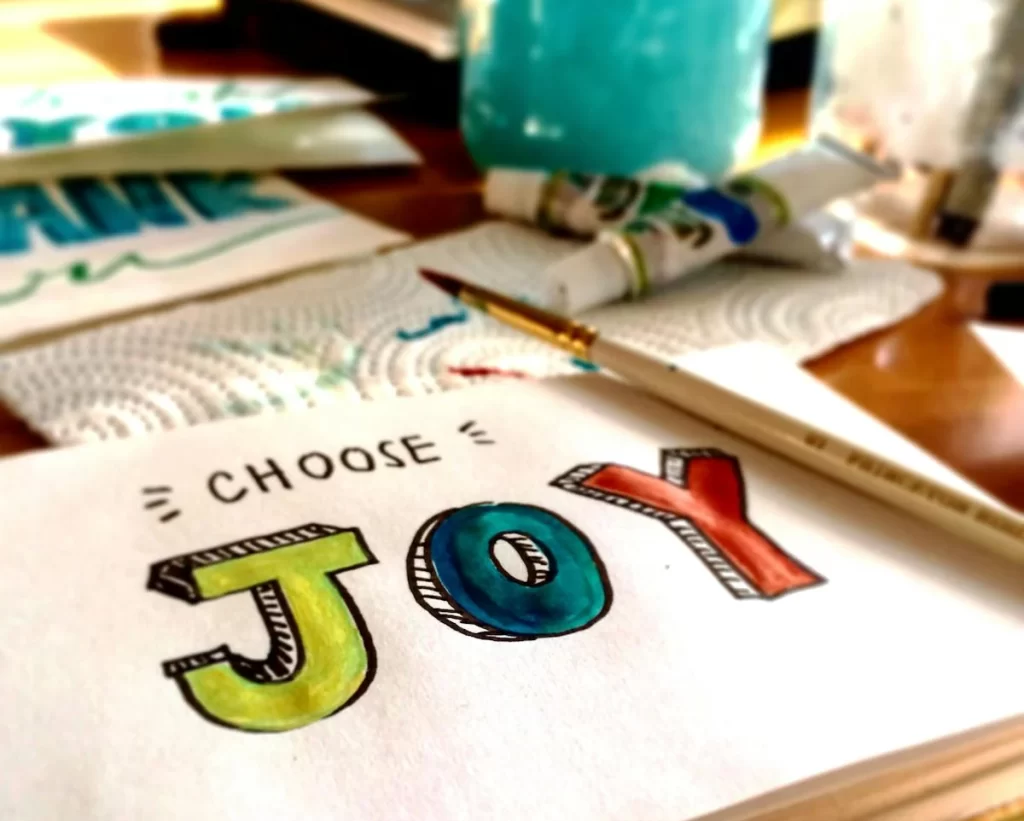 As the end of the year approaches, we are surrounded by positive vibes. First of Thanksgiving and then the winter holidays. We tend to be inundated with music, lights and uplifting spirits of the season. The idea is to spread joy and to ensure that those around you, despite what they’re going through, are also feeling that joy. Many assume all others are feeling joyous, too.
As the end of the year approaches, we are surrounded by positive vibes. First of Thanksgiving and then the winter holidays. We tend to be inundated with music, lights and uplifting spirits of the season. The idea is to spread joy and to ensure that those around you, despite what they’re going through, are also feeling that joy. Many assume all others are feeling joyous, too.
In Princeton, where there should be joy, some in our community have been feeling threats and hate instead. Have you seen the messages? Have you heard about them? To further spread joy, one must first be informed of the troubling realities that some in our community have encountered and are facing, for being who they are.
POLITICAL PAIN
Back in early November, as the General Election was approaching, people wanted their candidates to win. Some went to all ends to make that happen. But, at what costs?
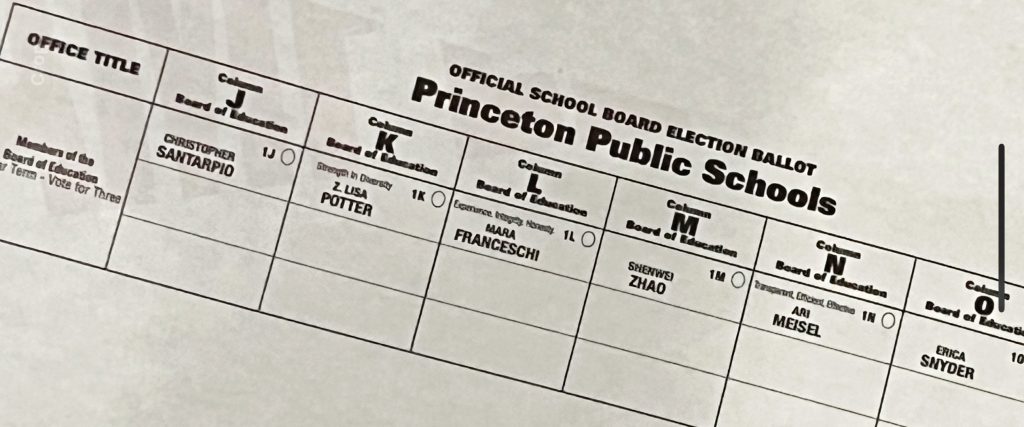 When a candidate throws their hat into the ring, they know that will mean unearthing of anything and everything they may have said or done. Though sometimes difficult, they open themselves up to that scrutiny. What is harder to swallow is when the accusations are not election-focused, or appear targeted and hate filled. Were you aware this happened in Princeton?
When a candidate throws their hat into the ring, they know that will mean unearthing of anything and everything they may have said or done. Though sometimes difficult, they open themselves up to that scrutiny. What is harder to swallow is when the accusations are not election-focused, or appear targeted and hate filled. Were you aware this happened in Princeton?
“I have never felt discriminated against since arriving here in 2000, so those attacks really did not bother me,” shares 2024 Princeton Public Schools Board of Education (BOE) candidate, Shenwei Zhao. “However, my experience during this Board of Education election in Princeton felt more like an ideological attack. Unfortunately, it seems that some people believe labeling others as racists simply for holding different opinions is an effective way to silence opposition and win the debate.”
Zhao is referring to a comment he made public, allegedly made from one Princeton resident to another via text about him and another BOE candidate, Z. Lisa Potter, that urged a need to prevent the two candidates from joining the BOE due to a “history of racist provocations.” Zhao publicly questioned what they had done that could be deemed racist.
For weeks, Zhao’s question was a launching pad for members of Princeton High School and Princeton Public School Facebook groups, speakers at Board of Education meetings and others to go on a public rampage, where instead of getting answers, both Zhao and Potter felt bullied and attacked. They felt a barrage of often twisted truths, made to seem relevant, or situations misinterpreted to send a political message. Often lacking a desire to understand the candidates and what they may have actually said or done, the attacks felt hate-filled against the only two Asian candidates.
“I haven’t experienced this level of discrimination since I first moved to the U.S. in the mid-1980s. During my time in West Windsor, I didn’t encounter anything like this, so facing such hostility here in Princeton was shocking. However, I don’t believe that this reflects the views of the majority of residents,” former BOE candidate Z. Lisa Potter explains. “Some groups resort to targeting others and framing them as ‘the enemy.’ Identity politics becomes the easiest, albeit lazy, way to do this—especially when there are no concrete facts or behaviors to substantiate their positions. This approach undermines genuine progress and fosters division, which is the opposite of what our community should stand for.”
The judgements often used stereotypes to cast a negative light. Zhao was, on several occasions, misidentified for other Asian men in Princeton and attacked for comments or actions they had made. He also had rumors spread about his response to questions, framing him negatively as an extreme Conservative. Potter was wrongly accused of aligning with others in the Asian community on things some had issue with. She was also called out as being unfit for the BOE role after her campaign lawn signs were found on properties that also hosted signs for Republican political candidates.
In an email to prospective voters during the campaign, Potter responded to the attacks.
“Moreover, the false narrative that Shenwei Zhao and I—the two minority candidates, both Asian—are ‘anti-DEI’ not only perpetuates harmful stereotypes, but also undermines the important conversations we need to have about inclusion and equity. If these remarks were made by Princeton Public Schools students about their peers, they undoubtedly would violate the district’s Harassment, Intimidation, and Bullying (HIB) policy. As adults, we have a responsibility to model respectful and inclusive behavior, especially for the younger generation watching us.”
Asians make up more than a quarter of the Princeton population but have not won an election here. Many are here as first-generation Americans, where they desire a more open debate on ideas. Since Princeton Perspectives began covering elections in 2020, we have seen Lisa Wu and Jeffrey Laio also run unsuccessfully.
“Neighboring towns (West Windsor, Montgomery, Bridgewater, to name just a few), all have already elected Asians, including first-generation immigrants, to their governing bodies. Yet Princeton seems to struggle with accepting that people from different backgrounds might not align with its so-called ‘progressive’ ideals,” Zhao says.
In America, voters get to decide what candidates they want to put into office (Potter lost by 277 votes, Zhao by 1,627). It has left some pondering the costs.
FROM POLITICS TO RELIGIOUS HATE
Just one week after the election, others became the target of local hate. Though Donald Trump lost in Princeton 5:1, he won the national election to become the next President of the United States. Some locals took that reality so hard they found a population to blame: the Jews.
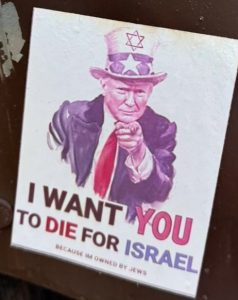 While going for his morning run on November 12th, Princeton resident Oleg Bleyman came upon a sticker attached to a light pole on Harrison Street. The sticker contained an image of Donald Trump, wearing a top hat with a Jewish star on it and the words “I want YOU to die for Israel” followed by “because I’m owned by Jews.” A small sign, it was a subtle way to spread not just a political attack, but Jew-hatred.
While going for his morning run on November 12th, Princeton resident Oleg Bleyman came upon a sticker attached to a light pole on Harrison Street. The sticker contained an image of Donald Trump, wearing a top hat with a Jewish star on it and the words “I want YOU to die for Israel” followed by “because I’m owned by Jews.” A small sign, it was a subtle way to spread not just a political attack, but Jew-hatred.
“I grew up in a country where antisemitism was part of life,” explains Bleyman, who was raised and lived his early adult life in Russia. “I can’t say I saw this coming, but I saw antisemitism growing with what’s been going in the cultural world. I’ve seen antisemitism shifting from right wing to left wing. I’m not surprised to see it in Princeton.”
Bleyman went on to explain that he left Russia because he thought America was great and would give him a chance (and he still does). He doesn’t fear yet that it is reaching the levels of antisemitism seen in Europe in the 1930s but does see antisemitism becoming part of a dangerous pervasive ideology.
OTHER CONCERNS OF HATE
Donald Trump’s election as President also immediately led to another group of people feeling threatened. Fear and anxiety began to spread amongst the Queer community almost overnight, including right here in Princeton.
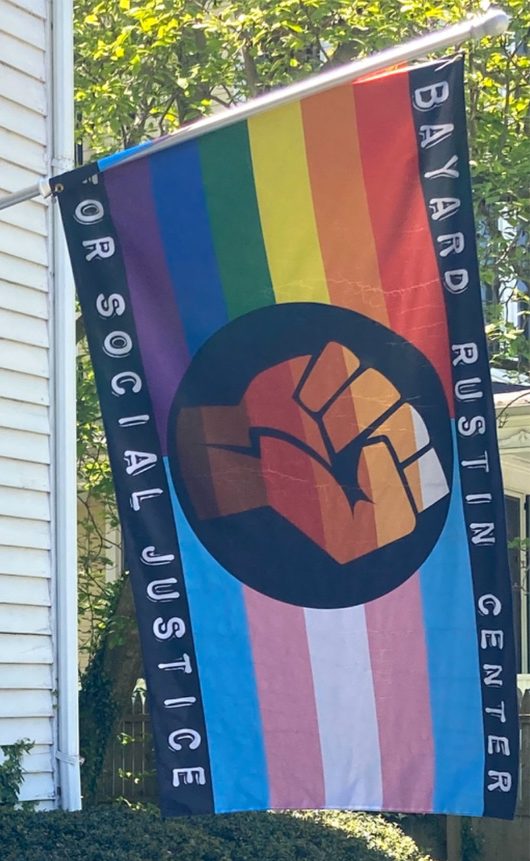 “What we’ve noticed most is an overwhelming feeling of despair, a lack of hope, and a true fear for physical and emotional safety, the ability for people to continue existing as they are, being respected for who they are, being able to love who they want,” notes Dr. Sara Wasserman, Bayard Rustin Center for Social Justice (BRCSJ) Queer Educator & Local Community Organizer.
“What we’ve noticed most is an overwhelming feeling of despair, a lack of hope, and a true fear for physical and emotional safety, the ability for people to continue existing as they are, being respected for who they are, being able to love who they want,” notes Dr. Sara Wasserman, Bayard Rustin Center for Social Justice (BRCSJ) Queer Educator & Local Community Organizer.
Concerns of access to gender affirming healthcare, marriage equality and community support have become overwhelming for many. The day after the election, an influx of people went to BRCSJ, seeking a safe place to feel their fears, make sense of what happened and feel support in a safe community. One young man arrived that day feeling desperate.
“He spent the day with our Safe-Space Hosts where he found a queer mentor of sorts with whom he continues to draw strength from and be in contact with to this day. Having a Safe-Space to not only talk with others but truly be heard, was in fact lifesaving for him and so many other folks. We have all now truly become essential workers, and here at BRCSJ Headquarters, we hold our service across the spectrum that much more sacrosanct. Now more than ever, we need to gather together in community, camaraderie, and co-conspiracy,” BRCSJ shared with Princeton Perspectives.
To be there for any member of the community, BRCSJ now has its LGBTQIA+ Safe-Space open seven days a week. It will also remain open on Christmas Day from 11am-3pm for those who need or want to celebrate.
PEOPLE ARE FINDING HATE IN OUR TOWN
Throughout the year, there has been many-a-discussion about ‘Free Speech” and when that speech can cross the line to be antisemitic. Is it actionable? Is it posing imminent harm? Does it damage property? Such was the case in recent weeks along the sidewalks of the Ettl Farm neighborhood in Princeton, where the expressions started to feel too close to home.
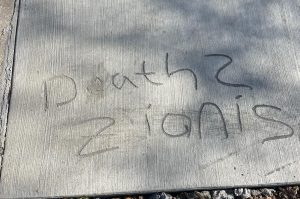 The concrete was left wet overnight as crews poured new sidewalks at the entrance to the neighborhood. On the morning of November 16th, local residents woke up to find “Death 2 Zionists” had been etched into it. Jewish parents shared numerous concerns that such words go beyond evoking concern for Palestinians, with death threats to those that believe in the right to the Jewish historic homeland.
The concrete was left wet overnight as crews poured new sidewalks at the entrance to the neighborhood. On the morning of November 16th, local residents woke up to find “Death 2 Zionists” had been etched into it. Jewish parents shared numerous concerns that such words go beyond evoking concern for Palestinians, with death threats to those that believe in the right to the Jewish historic homeland.
“We have been barraged with antisemitism since the October 7th attack on Israel. It is everywhere, we can’t ignore it. When I saw this in my own neighborhood, I realized that this is as close to home as it has been. It is frankly scary to think that my neighbors are calling for the death of my family and numerous other families in Ettl Farm,” shares Julie Ramirez, 21-year Ettl Farm resident.
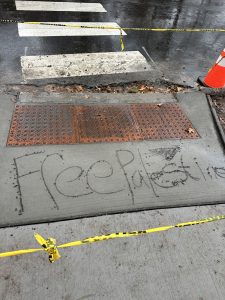 That sidewalk was promptly removed, and clean concrete poured to cover up the message, only for more to come. On November 26th, newly poured sidewalks in Ettl Farm had new graffiti, this time with the words “Free Palestine” and “Gaza Rise.” The culprit added to the words an image of an upside-down triangle, defined by American Jewish Committee as a symbol meant “to identify, harass, and target Israelis and Jews.”
That sidewalk was promptly removed, and clean concrete poured to cover up the message, only for more to come. On November 26th, newly poured sidewalks in Ettl Farm had new graffiti, this time with the words “Free Palestine” and “Gaza Rise.” The culprit added to the words an image of an upside-down triangle, defined by American Jewish Committee as a symbol meant “to identify, harass, and target Israelis and Jews.”
The next day, on November 27th, “Free Palestine” was carved in large letters across four sections of newly poured sidewalk, also at Ettl Farm. Princeton Police Detective Bureau has been working with the Mercer County Prosecutor’s office to actively pursue all leads and investigate these acts of criminal mischief.
“These incidents made me wonder why there is so much tolerance for this hate in our town, country and around the world. So much silence. It also made me fearful. What if the hate comes even closer to my house?” worried Ramirez. “I can’t rationalize the hatred on the streets of New York City where I grew up, the Princeton campus where my sons went to school and now on the sidewalks of my own neighborhood. It is clearly not about Israel and Gaza anymore.”
PRINCETON LOVES
If you leave Ettl Farm, and travel across Princeton, you will see signs like “Hate has no home here” and “No hate in the Garden State.” But, in situations like those mentioned above, some feel that hate has been welcomed.
As the music and lights of the holiday season spark a spirit of joy for you, remember that not everyone is feeling it. This is the time of year that you may feel encouraged to make an extra effort to ensure your neighbors know hate has no place near your home, too.

Lisa Jacknow spent years working in national and local news in and around New York City before moving to Princeton. Working as both a TV producer and news reporter, Lisa came to this area to focus on the local news of Mercer County at WZBN-TV. In recent years, she got immersed in the Princeton community by serving leadership roles at local schools in addition to volunteering for other local non-profits. In her free time, Lisa loves to spend time with her family, play tennis, sing and play the piano. A graduate of the S. I. Newhouse School of Public Communications at Syracuse University, Lisa was raised just north of Boston, Massachusetts but has lived in the tri-state area since college. She is excited to be Editor and head writer for Princeton Perspectives!
